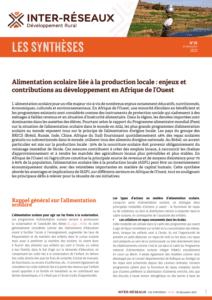Up to the end of the 90s, West African public authorities were very much involved in the management of export value chains (cotton, coffee, cocoa, groundnuts, etc). The States intervened by determining (and sometimes in a unilateral manner) the modes of functioning of these value chains: fixing the purchase price to the producers, conditions for the provision of inputs and marketing, modalities for export. The States could even be single direct operators: they had the monopoly to buy from the producers, exclusive rights to process the products and/or export them, or regulated the provision of inputs.
The structural adjustment programmes of the 80s led the states to gradually disengage themselves from the value chains, with the World Bank, International Monetary Fund (IMF) and other donors estimating that the effects of privatization of the value chains would be more effective in terms of development and regulation of the value chains. The technical functions of input supply, marketing, etc., which were hitherto provided by state run societies were as such transferred to the private sector and existing professional organizations which at the time were just emerging or even less organized. In this context of liberalization and faced with the inability of the professional organizations to initiate real strategies for collective regulation of the value chains and markets, the strategic importance ( in terms of source of foreign currency) of these once controlled value chains, led the public authorities to stimulate the creation of the first Interprofessional organizations (IOs) in West Africa: in 1992 the National Interprofessional Council for the groundnut sector (CNIA) in Senegal; and the Interprofessional Council for the cocoa and coffee (CICC) in Cameroon .
This note seeks to throw more light on the strategies of the actors within the coffee and cocoa commodity chain in Cameroon and the roles and services which the CICC provides to these different actors: farmers and producers’ organizations, middlemen, factory buyers, processors, exporters, forwarding agents and importers.







